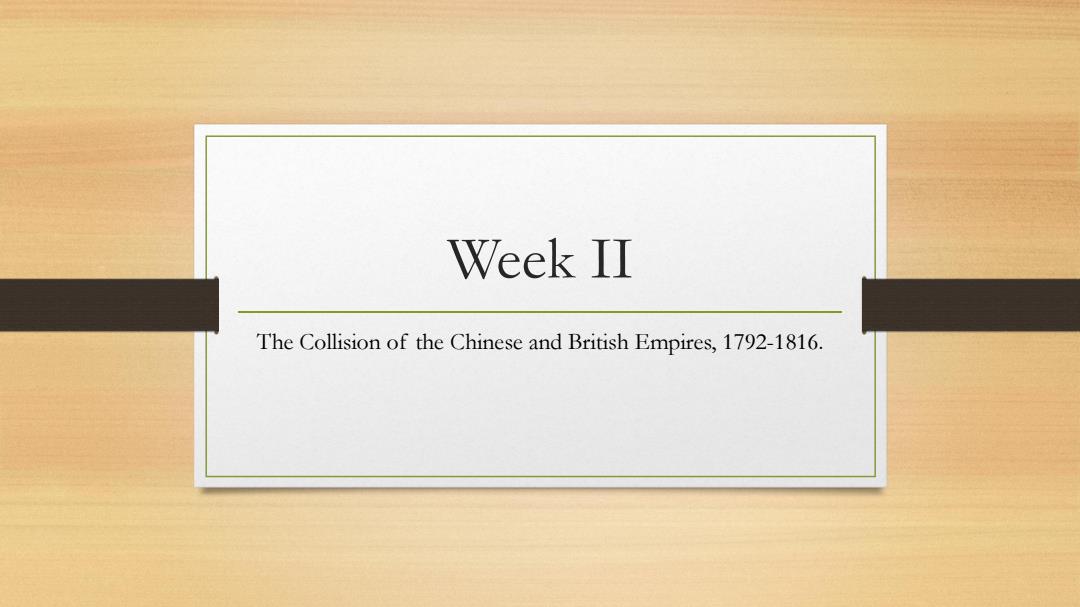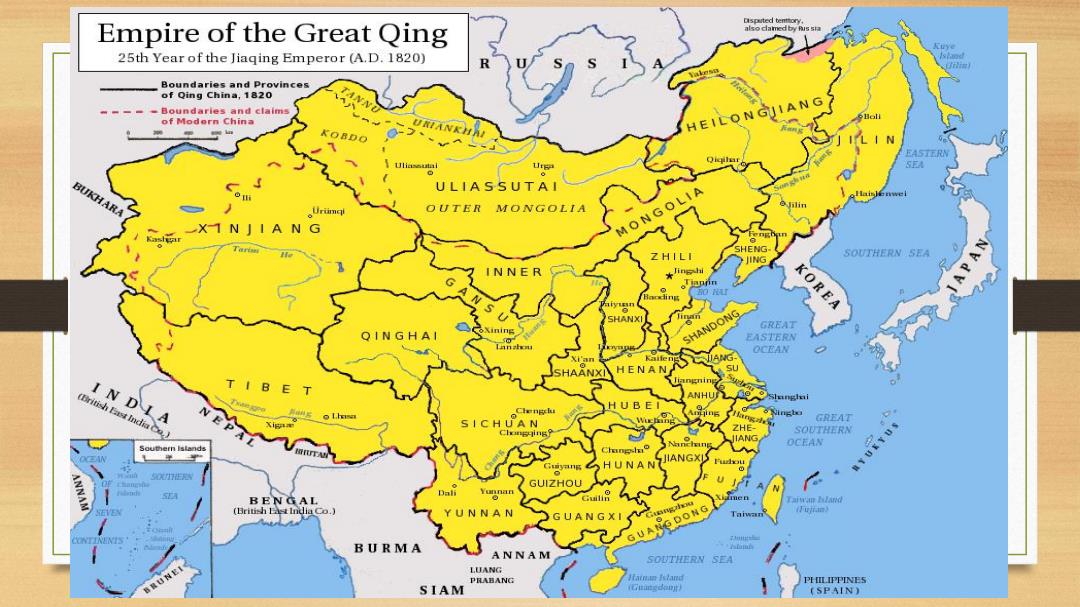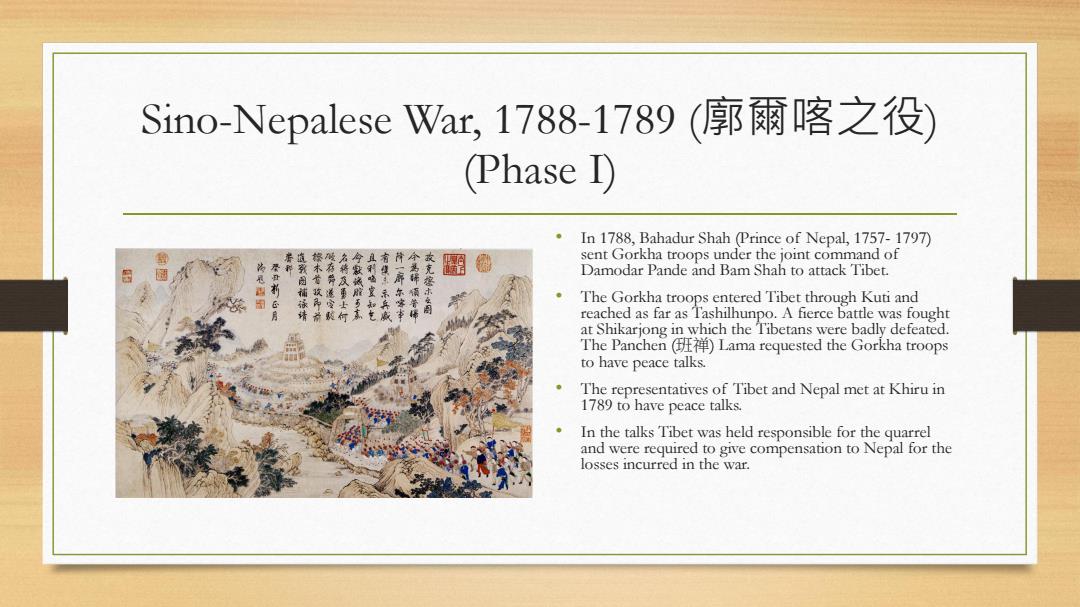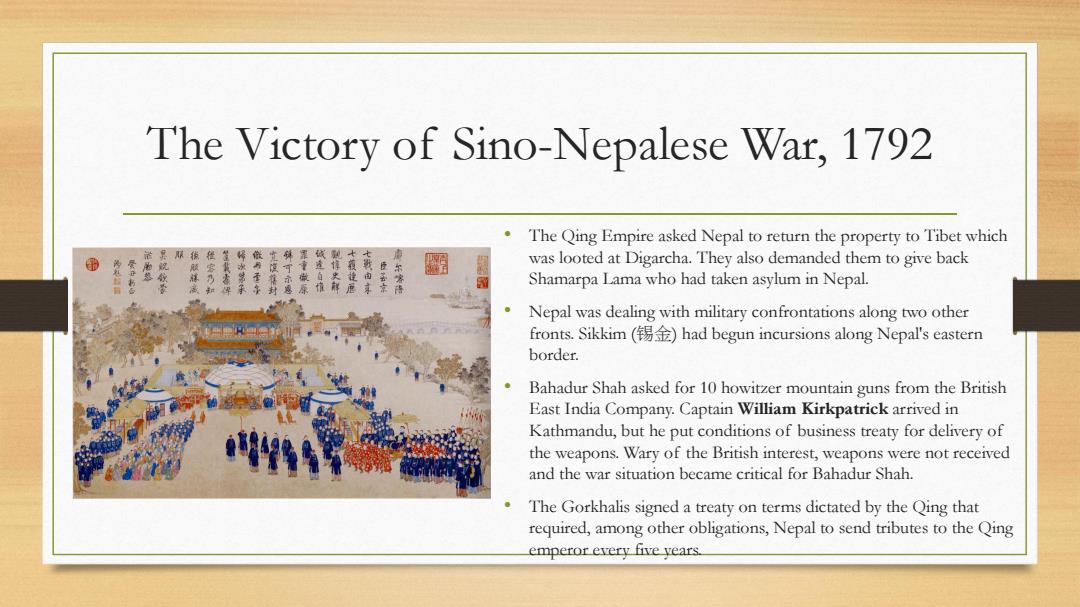
Week II The Collision of the Chinese and British Empires,1792-1816
Week II The Collision of the Chinese and British Empires, 1792-1816

Empire of the Great Qing 25th Year of the Jiaqing Emperor (A.D.1820) R Boundaries and Provinces of Qing China,1820 ----Boundaries and claims of Modern China KOBDO U BUKHARA ULIASSUTAI OUTER MONGOLIA XI N J IA N G MO SOUTHERN SEA INNER KOREA GREAT QINGHAI HAND EASTERN ENA SICHUAN GREAT SOUTHERN OCEAN IANGX HUNAN GUIZHOU N BENGAL (British Fast india Co.) YUNNAN GUANGX BURMA ANNAM SOUTHERN SEA LUANG PRABANG PH ILIPPINES SIAM (SPAIN)

Sino-Nepalese War,1788-1789(廓爾喀之役) (Phase I) In 1788,Bahadur Shah (Prince of Nepal,1757-1797) sent Gorkha troops under the joint command of 田6月 Damodar Pande and Bam Shah to attack Tibet. The Gorkha troops entered Tibet through Kuti and reached as far as Tashilhunpo.A fierce battle was fought at Shikarjong in which the Tibetans were badly defeated. The Panchen)Lama requested the Gorkha troops to have peace talks. The representatives of Tibet and Nepal met at Khiru in 1789 to have peace talks. In the talks Tibet was held responsible for the quarrel and were required to give compensation to Nepal for the losses incurred in the war
Sino-Nepalese War, 1788-1789 (廓爾喀之役) (Phase I) • In 1788, Bahadur Shah (Prince of Nepal, 1757- 1797) sent Gorkha troops under the joint command of Damodar Pande and Bam Shah to attack Tibet. • The Gorkha troops entered Tibet through Kuti and reached as far as Tashilhunpo. A fierce battle was fought at Shikarjong in which the Tibetans were badly defeated. The Panchen (班禅) Lama requested the Gorkha troops to have peace talks. • The representatives of Tibet and Nepal met at Khiru in 1789 to have peace talks. • In the talks Tibet was held responsible for the quarrel and were required to give compensation to Nepal for the losses incurred in the war

Sino-Nepalese War,1791-1792 Phase ID) As Tibet had refused to pay the tribute to Nepal,Bahadur Shah sent a troop to Kuti in 不 通 云间 政克 1791.Damodar Pande attacked Digarcha and captured the property of the monastery there. 5 He also arrested the minister of Lhasa,Dhoren Kazi and came back to Nepal. Qianlong sent a strong troop of 70,000 soldiers under the leadership of Fuk'anggan(福康安) to defend Tibet. In 1792 the Nepal-Tibet war turned into a war between Nepal and the Qing empire
Sino-Nepalese War, 1791-1792 (Phase II) • As Tibet had refused to pay the tribute to Nepal, Bahadur Shah sent a troop to Kuti in 1791. Damodar Pande attacked Digarcha and captured the property of the monastery there. He also arrested the minister of Lhasa, Dhoren Kazi and came back to Nepal. • Qianlong sent a strong troop of 70,000 soldiers under the leadership of Fuk‘anggan (福康安) to defend Tibet. • In 1792 the Nepal - Tibet war turned into a war between Nepal and the Qing empire

The Victory of Sino-Nepalese War,1792 The Qing Empire asked Nepal to return the property to Tibet which was looted at Digarcha.They also demanded them to give back Shamarpa Lama who had taken asylum in Nepal. Nepal was dealing with military confrontations along two other fronts.Sikkim (had begun incursions along Nepal's eastern border. Bahadur Shah asked for 10 howitzer mountain guns from the British East India Company.Captain William Kirkpatrick arrived in Kathmandu,but he put conditions of business treaty for delivery of the weapons.Wary of the British interest,weapons were not received and the war situation became critical for Bahadur Shah. The Gorkhalis signed a treaty on terms dictated by the Qing that required,among other obligations,Nepal to send tributes to the Qing emperor every five vears
The Victory of Sino-Nepalese War, 1792 • The Qing Empire asked Nepal to return the property to Tibet which was looted at Digarcha. They also demanded them to give back Shamarpa Lama who had taken asylum in Nepal. • Nepal was dealing with military confrontations along two other fronts. Sikkim (锡金) had begun incursions along Nepal's eastern border. • Bahadur Shah asked for 10 howitzer mountain guns from the British East India Company. Captain William Kirkpatrick arrived in Kathmandu, but he put conditions of business treaty for delivery of the weapons. Wary of the British interest, weapons were not received and the war situation became critical for Bahadur Shah. • The Gorkhalis signed a treaty on terms dictated by the Qing that required, among other obligations, Nepal to send tributes to the Qing emperor every five years